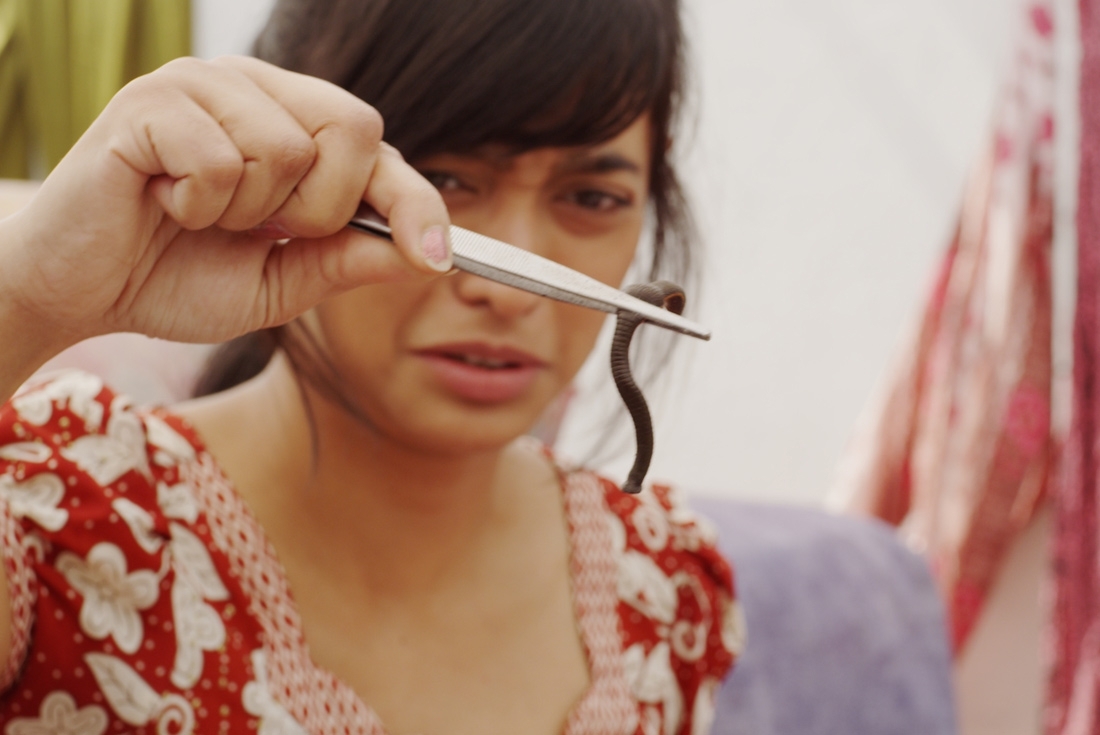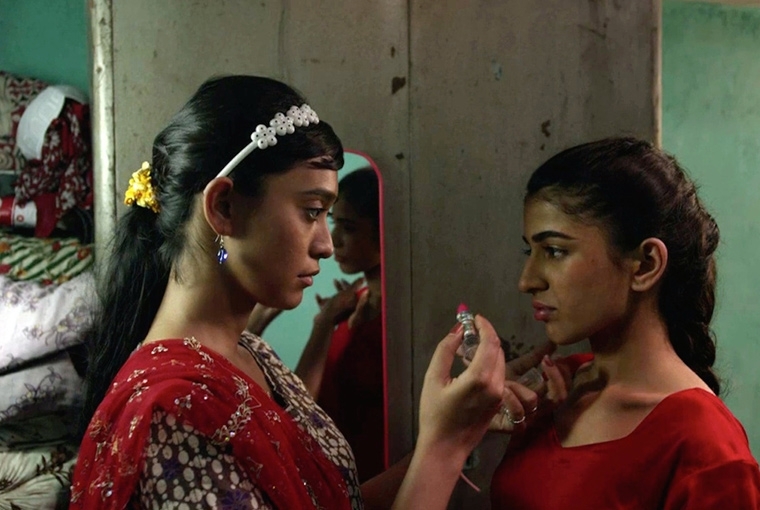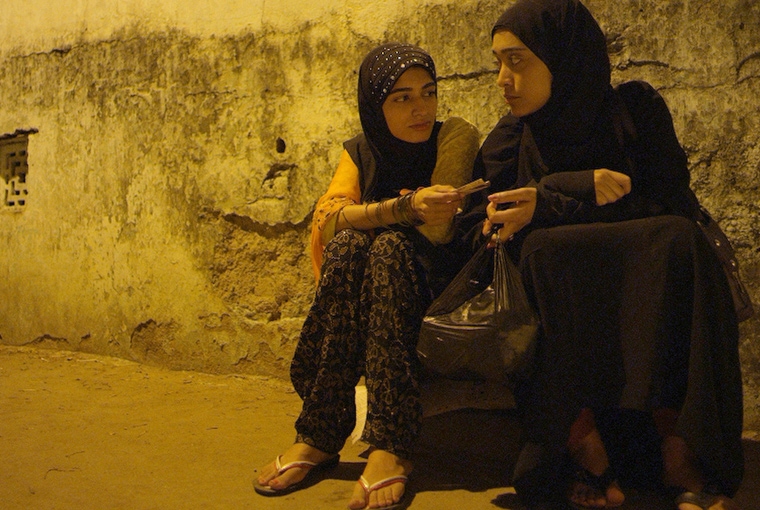

A new bride suppresses her screams, squirms in inexplicable disgust, and cringes at her grave act that shows the extremes to which one is pushed, owing to the archaic practice of one-day brides in Hyderabad. But Sayani Gupta's powerful performance isn't the only thing that hooks you to Payal Sethi's very important film, Leeches. The loathsome creatures stand metaphorically for the rich men who indulge in the malicious practice of hiring brides and discarding them.... though this is not the only part they play.
Foreign businessmen take brides, the rates of which depend on the duration of the marriage and their beauty, of course. Dig a bit deeper and you’ll know that there are opportunists who facilitate this flesh trade - often termed as the last resort for the people living in Muslim ghettos.
Payal Sethi, whom I got the chance to interact with at the recently concluded Dharamsala International Film Festival, has directed the film that has won accolades world over. Minutes post the screening that kept me on the edge of my seat, Payal made clear the desperation of a community in the Charminar city. Excerpts.
Payal Sethi graduated from Vassar College with a major in Film Production & History. She also studied 16mm film production at NYU's Tisch School of the Arts. After graduating, she worked at Mira Nair's Mirabai Films on the The Namesake, Hysterical Blindness and Vanity Fair, and later at the Tribeca Film Festival.
What drew you to filmmaking?
I always wanted to write. I thought I would be a journalist at first. I did an internship at TOI right after school. And then I went to Vassar where I did my undergrad in Upstate New York where I thought I am going to take creative writing as a major but I found the class completely pointless and pretentious. It was just not me. I ended up taking classes in anthropology, sociology, Russian Literature... I was a math minor as well and then finally I took a film course which was a year long film history and appreciation course. That introduced me to world cinema including India that I had not seen - like Ray, Gautam Ghosh, even Mira Nair for that matter. This is how filmmaking came into the scene and writing came from the screenwriting classes I took which made me realize that this is the kind of writing I like. Post my course, I ended up working with Mira for almost five years. From Monsoon Wedding to The Namesake.

A still from Leeches
Tell me about the first ever movie that made an impression on you?
I much have been very little but Mr. India definitely made an impression on me. My mother is a huge cinema buff... and now thanks to what I do, her horizons have also expanded. She introduced me to a lot of black and white cinema... and we used to watch a lot of Tamil cinema as well. It was a mixture of a lot of different kinds of cinema.
Talking about your film Leeches, when did you first hear about the malicious practice?
I was in Hyderabad where I read a news piece on one-day brides in Hyderabad. I would spend a lot of time roaming around the Charminar area, the old city and we were looking for a place to print wedding cards and someone sent me to this shop in the same area. The multiple trips to the area got me thinking as to how many girls around have been a part of this or will be in the future. It just kind of changed everything for me. I kept wanting to look more and discover what's actually happening behind these veils.
Have you ever met one these girls?
I did alot of research at the time during which I came across this organisation called Shaheen which is run by this amazing woman called Jameela Nishat. I sent her message on Facebook and asked her if I could meet her. From the moment I met them, they pretty much opened their doors to me. I used to often go to their office in the old city which was sort of a controlled environment and not very many people go there.

A still from Leeches
Is this a legal act?
There is a lot of misconception among people about why the prophet allowed multiple marriages which has lead people to conveniently mould it the way they want. He actually did that for women who were divorced or were to poor to be married or were just unfortunate in some way. To give them a name, to give them 'respectability'. Back then essentially these men used to give them a life that they didn't have before. And then this whole temporary marriage thing also has its roots in something honourable. During the Silk Route days, the Arab traders usually came to Kerela for a year or so. They would marry these girls, give them a home, money and take care of them for the rest of their lives. And that's how the practice started. Now it has turned into prostitution, there is no other word for it.
What was the idea behind the film?
I didn't want to represent anything or anyone in a way that is you know was coming from a prejudice or coming from mind pressure of what is right or wrong. But rather present the facts as they are, and allow people to draw their own conclusions and have their own reactions to it, which is what I hope the film does. Ultimately it is a work of fiction, very much based on fact and reality but I'm trying to make people aware of that fact that something like this is happening, and also make people feel something on a very visceral level. There is this scene in the movie during which I always turn around to notice how people react to it. I have seen people react physically to it and that is how we should feel about what is happening with these girls. It's painful, distasteful, and disturbing. That was my idea behind the film; not to preach but just to open people's eyes.
What are you working on next?
Leeches happened because I was working on a script that I had written in New York. I was ready to make it and I did find a producer in Bombay and they were very nice, but I think the creative differences lead to an amicable parting. That's when Leeches happened. In between there have two scripts that I have written, several other ideas that I would like to develop and one of my scripts was picked for Fellowship for screenwriters where my story was picked. But right now I am producing and directing my friend's script which is called Maya Delux; it's a humanistic thriller, a social drama. Basically its the story of two migrants running a lodge in a small town and they become involved in an accidental crime. And it's about how they are trying to prevent themselves from getting caught by the police as well as keeping their illegal migration under wraps.
Text Hansika Lohani Mehtani